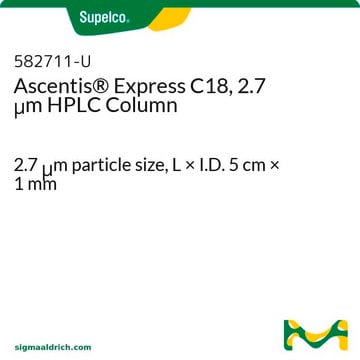53569-U
Ascentis® Express 90 Å F5 (2.7 μm) HPLC Columns
L × I.D. 10 cm × 2.1 mm, HPLC Column
Synonym(e):
Core-shell (SPP) Fused Core PFP HPLC column
About This Item
Empfohlene Produkte
product name
Ascentis® Express F5, 2.7 μm HPLC Column, 2.7 μm particle size, L × I.D. 10 cm × 2.1 mm
Materialien
stainless steel column
Qualitätsniveau
Agentur
suitable for ISO 21675 2019
suitable for USP L43
Produktlinie
Ascentis®
Leistungsmerkmale
endcapped
Hersteller/Markenname
Ascentis®
Verpackung
1 ea of
Parameter
60 °C temp. range
600 bar max. pressure (9000 psi)
Methode(n)
HPLC: suitable
LC/MS: suitable
UHPLC-MS: suitable
UHPLC: suitable
L × ID
10 cm × 2.1 mm
Oberflächenbereich
135 m2/g
Verunreinigungen
<5 ppm metals
Matrix
Fused-Core particle platform
superficially porous particle
Aktive Matrixgruppe
PFP (pentafluorophenyl) phase
Partikelgröße
2.7 μm
Porengröße
90 Å pore size
Betriebs-pH-Wert
2-8
Anwendung(en)
food and beverages
Trenntechnik
reversed phase
Suchen Sie nach ähnlichen Produkten? Aufrufen Leitfaden zum Produktvergleich
Allgemeine Beschreibung
Anwendung
- Interference of Preservatives on Urinary Iodine Measurement by Sandell-Kolthoff Method.: This research examines the impact of preservatives, including hydrochloric acid, on the accuracy of urinary iodine measurements. The study highlights the need for careful selection of preservatives to avoid analytical interference (Kaya et al., 2022).
- Monitoring the Extraction of Copper from Chicken Dung Leachate Using an Aluminium Electrode as an Indicator.: The study explores the use of hydrochloric acid in the leaching process of copper from chicken dung. It demonstrates the effectiveness of hydrochloric acid in extracting metals from organic waste materials (Kugeria et al., 2019).
- Development of an Analytical Method for Urocanic Acid Isomers in Fish Based on Reactive Extraction Cleanup and Chaotropic Chromatography Techniques.: This paper details a method using hydrochloric acid for the extraction and analysis of urocanic acid isomers in fish. The method enhances the detection and quantification of these compounds in biological samples (Zhong et al., 2018).
- Determination of Single-Ion Activities of H+ and Cl- in Aqueous Hydrochloric Acid Solutions by Use of an Ionic Liquid Salt Bridge.: The research provides a novel approach to determining the activities of hydrogen and chloride ions in hydrochloric acid solutions using an ionic liquid salt bridge, contributing to the understanding of ion behavior in aqueous solutions (Sakaida et al., 2011).
Rechtliche Hinweise
Anwendung
Erforderlich, aber nicht bereitgestellt
Vorsäulenkartusche
Ähnliches Produkt
Lagerklassenschlüssel
11 - Combustible Solids
WGK
WGK 3
Flammpunkt (°F)
Not applicable
Flammpunkt (°C)
Not applicable
Hier finden Sie alle aktuellen Versionen:
Analysenzertifikate (COA)
Die passende Version wird nicht angezeigt?
Wenn Sie eine bestimmte Version benötigen, können Sie anhand der Lot- oder Chargennummer nach einem spezifischen Zertifikat suchen.
Besitzen Sie dieses Produkt bereits?
In der Dokumentenbibliothek finden Sie die Dokumentation zu den Produkten, die Sie kürzlich erworben haben.
Kunden haben sich ebenfalls angesehen
Chromatograms
application for HPLCapplication for HPLCapplication for HPLCapplication for HPLCMehr anzeigenUnser Team von Wissenschaftlern verfügt über Erfahrung in allen Forschungsbereichen einschließlich Life Science, Materialwissenschaften, chemischer Synthese, Chromatographie, Analytik und vielen mehr..
Setzen Sie sich mit dem technischen Dienst in Verbindung.







